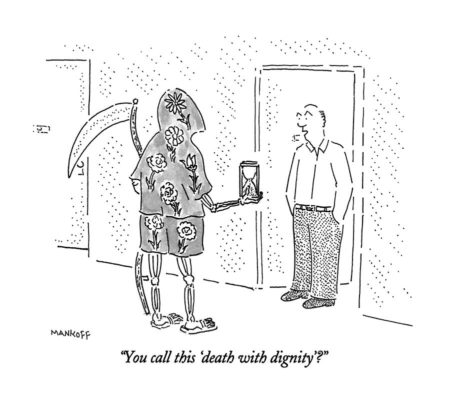The Death with Dignity Act (HB1659) starts by saying: The state of New Hampshire recognizes that persons have a right, founded in the autonomy of the person, to control the decisions relating to the rendering of their own medical care. So, right away, it’s lying. Because this were true, you wouldn’t have to get prescriptions to take medicine, whether to cure or kill yourself.
What the state of NH actually recognizes is that you may ask permission, not exercise a right, to make some decisions relating to the rendering of your own medical care.
If the state actually recognized the right as it’s stated here, there would be absolutely no need for this bill in the first place.
For that matter, the bill could just stop right there, and it would allow anyone to obtain the medications necessary for a dignified exit from life, without having to get anyone’s permission.
The bill continues, saying that the option of using prescription drugs to end one’s life will be available to those in a condition of severe, unrelenting suffering. But as any Buddhist will tell you, the whole of life is a condition of severe, unrelenting suffering. So for a Buddhist, that phrase just refers to anyone, in any state.
I’m only half-kidding about that. But the opportunities for ‘interpretation’ of this phrase by the courts are unbounded. For example, is someone suffering from clinical depression ‘in a condition of severe, unrelenting suffering’? He would say so. But someone else might say, no, it might be possible to alleviate the suffering through treatment.
Of course, suffering can always be alleviated through some kind of treatment, even if it’s just keeping someone doped up all the time, or performing a lobotomy, or taking some other palliative measures. If ‘unrelenting’ ends up meaning ‘incurable’… well, you never know what cure might be just around the corner, so it becomes an impossible standard to meet.
So it would be possible for the courts to interpret this bill as effectively meaning nothing at all — much like the Supreme Court did with the Privileges and Immunities clause of the 14th Amendment.
(It’s also interesting to contemplate whether a police officer or EMT who saves someone from an overdose that was intended to be an exit from life could be prosecuted, under 18 USC 242, for violating that person’s right to control decisions relating to the rendering of his own medical care. But I digress.)
And I’m not even out of the first paragraph yet! So let’s cut to the chase.
Imagine a similar bill saying, essentially, that New Hampshire recognizes that persons have a right, founded in the autonomy of the person, to control the decisions relating to the defense of their lives… so long as they can get specified permissions from capable, qualified law enforcement officers who will certify that they have a severe, unrelenting need for self-defense.
Would that not (to anyone but a Democrat) be ludicrous?
While I am in complete sympathy with the goals of this bill, it perpetuates the idea that the state can call something a right but treat it like a privilege, and does so using language that pretty much guarantees an endless series of court cases as people argue over vague terms.
It would be just as effective, and considerably more honest, to just replace the text of the bill with a single sentence, saying that people can petition the courts for permission to obtain prescription medicines that they can use to end their lives.
As effective, because that’s how it’s going to work out in practice anyway.
More honest, because instead of providing additional cover for the bait-and-switch game that the state now plays with this and other ‘rights’ that require the state’s permission to exercise, it would be clear statement of the state’s understanding of your status… as its property.
Also, about that title — is there anything less dignified than having to beg someone else to evaluate your suffering, so he can decide that it’s severe and unrelenting enough for you to get permission to end that suffering in a peaceful way?
